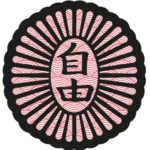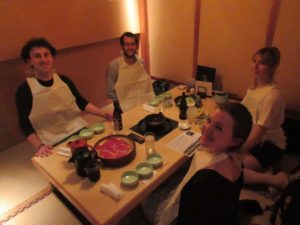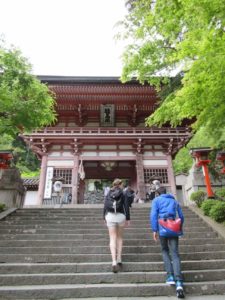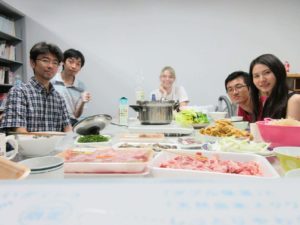Jiyuu-Hugo Sarrade Scholarship
Dossiers to be sent before February 3, 2017
Application form - Hugo Sarrade grant
"Jiyuu" means "Freedom" in Japanese. This scholarship was created in January 2016 at the initiative of Stéphane Sarrade in memory of his son Hugo, the 23-year-old victim of the attacks that struck France on November 13, 2015.
Worth 5,000 euros, this scholarship supports a student wishing to carry out an internship in Japan with the aim of enriching his/her scientific training. It is aimed at a student from the Montpellier Faculty of Science enrolled either in a scientific Master's program (in any field), or in the Polytech engineering school.
Selection process / Timetable
The application file mustinclude a letter of motivation in which candidates explain:
=> why this internship,
=> why Japan,
=> how this internship fits in with their training,
=> the student's career plan.
This letter of motivation will be decisive in the selection of the winner of the Jiyuu - Hugo Sarrade Scholarship.
The completed application must be sent before February 3, 2017 to the following e-mail address:fds.affgen@umontpellier.fr
Incomplete or incorrectly completed applications will not be processed.
Candidates will be selected in February 2017 by a jury composed of :
Stéphane Sarrade, Hugo's father, himself an alumnus of Polytech Montpellier and the Montpellier Faculty of Science,
Gilles Halbout, President of the COMUE,
Serge Pravosoudovich, Director of Polytech,
Jean-Parick Respaut, Vice-President of the University of Montpellier, in charge of training and university life,
A representative of the Fondation ParisTech.
On Thursday, February 23, 2017, candidates will be informed of the jury's conclusions:
the student whose application has been accepted, on condition that he/she provides proof of his/her internship in Japan,
those whose application has not been accepted.
The jury's decisions are final.
Award date to be determined
Portrait of Hugo Sarrade
Hugo Sarrade was studying for a Master's degree in Computer Science at the Montpellier Faculty of Science, and was destined to do research in the field of artificial intelligence. He was particularly fond of Japan, a country he knew well and in which he was planning to write his thesis.
Hugo Sarrade was fascinated by this country, which favors the natural coexistence of technological and cultural spheres, with respect for others and the community.
Hugo Sarrade believed that innovation comes from confrontation with other knowledge and different technological approaches.
Alexandra Vinchent, winner of the 1st scholarship, tells us about her experience
Interview with Alexandra Vinchent, winner of the First Jiyuu-Hugo Sarrade Scholarship - 2016 - Internship at the Kyoto Chemical Research Institute from April to June 2016
- "Hello Alexandra, you're the winner of the First Jiyuu-Hugo Sarrade Scholarship, thanks to which you were able to carry out your first-year Master Sciences et Numériques pour la Santé internship at the Kyoto Chemical Research Institute from April to June 2016. Can you tell us about this experience? "
Answer: It was a truly enriching experience, and I have very fond memories of it! I was integrated into a research laboratory under the supervision of a wonderful sensei - tutor in Japanese. During the week, my working hours were quite flexible and mirrored those of my colleagues: I arrived between 10 and 11 a.m., worked and attended seminars in English or Japanese. In the evenings, I'd have dinner with my colleague Winnie at around 6-7pm and then go back to work until 9-10pm. The weekends enabled me to visit Kyoto and other Japanese cities - Himeji, Kobe, Osaka, Kurama and Tokyo - with other young people I met there. The atmosphere was really friendly throughout my stay: we went out together very often, immersed ourselves in Japanese culture, prepared convivial meals... The days were packed!
- "What did you take away from your experience?"
Answer: Many positive things: new acquaintances, new friends, wonderful memories and, above all, a horizon that seems much richer than before!
- "Do you have an anecdote to tell us?"
Answer: During a festival in Kyoto called "Aoi Matsuri", my friends and I decided to wear real kimonos. We booked them online at a store that offered rentals. I didn't expect it to be so complicated: we had at least 3 or 4 layers of clothing on top of the kimono. Dressing took an average of 1 hour, including hairdressing! When we arrived at Kyoto's Royal Palace, where the festival began, we were amazed to find that only a few people had donned this traditional garment, even though it - along with the yukata - is usually a Japanese favorite for these traditional celebrations. Our outfit amused a lot of people, both Japanese and foreigners, who didn't fail to take pictures of us! This day remains one of my fondest memories.
- "What are your plans today?"
Answer: After this experience, I've decided to go back to work, but won't rule out going back to school in the future to acquire new skills.
I'm also planning to return to Japan to see my friends and visit other places: my experience has really introduced me to a magical country that I want to discover even more!



